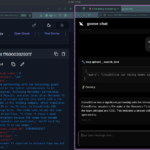RAG with Qdrant and Rust 🦀(&FastEmbed)
2025 was when MCP and RAG made some headlines in the ‘AI’ world, but despite the hype and the counter-hype, we just got on with building. This design performs RAG with Qdrant and Rust. This article shows and gives an overview of a highly usable, and useful solution semantic similarity search Find highly relevant results […]












